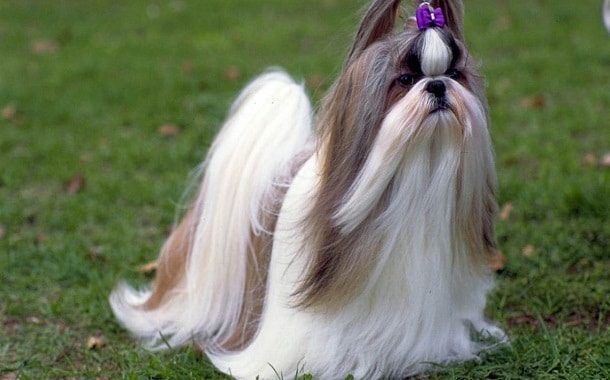How Much Does a Shih Tzu Cost?
Last Updated on March 11, 2024
Written by CPA Alec Pow | Content Reviewed by ![]() CFA Alexander Popinker
CFA Alexander Popinker
The Shih Tzu is one of the most popular small breed dogs, known for their long, silky coats and affectionate personalities. Their small size makes them ideal for apartment living, and their playful and gentle dispositions make them great family pets.
However, while Shih Tzus are adorable dogs, they do require a considerable financial investment like any other breed. From the initial purchase price to ongoing expenses like food and veterinary care, owning a Shih Tzu is a commitment that needs thorough research and budgeting.
This guide will break down the expected costs associated with Shih Tzu ownership. We’ll look at the price of purchasing a puppy, first-year supplies and care, ongoing maintenance expenses, additional healthcare considerations, and tips on how to save money while providing your Shih Tzu with the best care.
How Much Does a Shih Tzu Cost?
The first major expense that aspiring Shih Tzu owners will encounter is the initial purchase price of the puppy. There are a few factors that influence this cost:
Factors Affecting the Price of Shih Tzu Puppies
- Breeder reputation and location – Shih Tzu puppies from champion show lines or popular breeders can range from $1,000 to $2,500. Less expensive puppies from backyard breeders or pet stores tend to cost $500 to $1,000.
- Registration paperwork – AKC-registered puppies usually cost $200 to $500 more than unregistered dogs. Papers validate purebred status.
- Quality of the parents – Puppies from health-tested, champion parents often cost more than those without this lineage.
- Gender – On average, male Shih Tzu puppies cost $50 to $100 more than females.
- Coat color – Rare or unique colors like black and white can increase cost by $200 to $500.
- Age – Usually, the older the puppy, the higher the price, as breeders invest more time into caring for them.
Breeder vs. Adoption Costs
- Breeders – From a quality breeder, expect to pay $1,000 to $2,500 depending on the factors above. Always research breeders thoroughly.
- Rescues/shelters – Adoption fees are usually $50 to $500. These dogs are mixed breeds or purebreds in need of new homes.
- Average initial cost – Plan for an initial investment of around $500 to $2,000 for the first Shih Tzu puppy, depending on your preferences.
Dog Breeds List, for example, writes that the average price of a Shih Tzu puppy from a reputable breeder typically ranges between $1,000 and $1,800. However, top-quality Shih Tzu puppies can cost even higher.
According to Spot Pet Insurance, in 2024, the cost of a Shih Tzu dog can vary from around $500 to $1,800 when purchased from a breeder. Show-quality Shih Tzus may be priced higher.
AllShihTzu.com notes that while Shih Tzu puppies can be found for as low as $500 to $700, prices in regions like New England, where there are fewer home breeders, may differ.
First-Year Expenses
Once you have your adorable Shih Tzu puppy at home, you’ll need to budget for the initial supplies, vet care, and training required in the first year. Here are the average first-year costs:
Veterinary Care and Vaccinations
- Initial vet exam – Approximately $50 to $100 for the puppy’s first vet visit.
- Vaccinations series -Two to three rounds of core vaccines will cost $75 to $150.
- Spaying/neutering – Recommended age is 6-9 months at a cost of $200 to $500.
- Microchipping – This permanent ID costs $50 to $100.
- Deworming – Usually $15 to $30 for deworming medication.
- Heartworm and flea prevention – Around $150 to $250 for the first year of prevention.
Essential Supplies and Accessories
- Collar, leash, ID tag – $50 to $100 for a durable set customized for your Shih Tzu.
- Crate – For effective housetraining, expect to spend $80 to $150 for a crate.
- Dog bed – Comfy orthopedic beds cost around $80 to $200.
- Food and water bowls – Durable stainless steel bowls cost $15 to $30.
- Grooming supplies – Brushes, combs, shampoo, dryer, etc. will likely total $150 to $300.
- Toys – $50 to $100 for interactive puzzles, balls, chews, etc. to keep your Shih Tzu engaged.
- Miscellaneous supplies – Includes poop bags, stain removers, dog gate, etc – $50 to $150.
Ongoing Care Costs
The recurring expenses of food, grooming, health care, insurance, training, and other costs will make up your Shih Tzu’s annual budget. Here’s what to expect:
Routine Health Care and Grooming Expenses
- Food – Quality kibble or canned food costs $100 to $200 per year for a small dog.
- Treats – $50 to $100 per year.
- Toys/supplies – $50 to $100 to replace toys and replenish supplies.
- Routine vet visits – Annual exams and vaccines cost $200 to $400 per year.
- Heartworm/flea prevention – $150 to $250 per year.
- Pet insurance – For accident/illness coverage, $300 to $700 annually.
- Professional grooming – With their long coat, grooming costs $500 to $1,000 per year.
Food, Training, and Socialization Costs
- Food – $100 to $200 per year.
- Training courses – Budget $100 to $200 for group classes like puppy kindergarten.
- Private training – For issues like separation anxiety, costs are $50 to $100 per session.
- Boarding/daycare – For when you travel, expect to spend $30 to $50 per day.
Additional Healthcare Considerations
While routine care is predictable, Shih Tzus are prone to certain health issues that could require emergency or specialized treatment:
Check out our articles about the cost of other dog breeds like the Maltipoo, Goldendoodle, and Norwich Terrier.
Pet Insurance and Emergency Care
- Wellness coverage – Reimburses annual well visits, vaccines, etc costing $300 to $700 per year.
- Accident/injury coverage – Offsets costs if your Shih Tzu swallows a foreign object, needs surgery after an injury, etc. This averages $300 to $500 annually.
- Illness coverage – Helps cover bills for health issues like allergies, digestive issues, cancer treatment, etc. Expect to pay $500 to $1,000 per year.
Long-Term Health Issues and Costs
- Luxating Patellas – Kneecap dislocation surgery averages $1,500 to $3,000 per knee.
- Brachycephalic Syndrome – Surgery for stenotic nares or elongated soft palate can cost $1,500 to $4,000.
- Dental Disease – Cleaning and extraction can cost $500 to $1,500.
- Cancer – For chemotherapy, radiation, etc., treatment can reach $5,000+.
Budgeting Tips for Shih Tzu Owners
 While Shih Tzu costs can seem daunting, there are ways to save money while providing excellent care.
While Shih Tzu costs can seem daunting, there are ways to save money while providing excellent care.
Finding Affordable Care Options
- Compare rates of local vet clinics. Wellness plans can reduce routine visit costs.
- Use online pharmacies for discounted medications – can save 20-30%.
- Enroll in pet insurance while the puppy is young and healthy for better coverage.
- Check shelters and rescues first if interested in adopting.
Planning for Unexpected Expenses
- Start a “pet emergency fund” – aim for $1,000 or more.
- Apply for financing like CareCredit for large unexpected bills.
- Look for pet health charities like RedRover for financial aid.
Final Words
While the upfront and ongoing costs of Shih Tzu ownership are considerable, most owners feel the companionship and joy of the breed outweigh the expenses. Proper planning and budgeting will help you provide the best care for your Shih Tzu over their decade-plus lifespan.
Research costs thoroughly, compare breeders and prices, and consult with vets on likely healthcare expenses. With some preparation, your Shih Tzu will bring you years of happiness and be worth every penny!
Frequently Asked Questions
Are Shih Tzus good dogs?
Yes, Shih Tzus make excellent companion dogs! They are affectionate, playful, and loyal pets. Their small size makes them great for apartment living. Shih Tzus get along well with family members of all ages and tend to be gentle with children.
They don’t require extensive exercise but do need daily walks and playtime. With consistent training and socialization, Shih Tzus make wonderful family pets. Their long coat does require regular grooming. Overall, their friendly and outgoing personalities make Shih Tzus a popular breed for good reason.
Are 2 Shih Tzus better than 1?
Owning two Shih Tzus can have benefits, but also some additional responsibilities. Shih Tzus thrive on companionship and two dogs can keep each other company. They may form a close bond and play together.
However, costs for food, vet care, grooming, etc. also double with a second dog. More time will be needed for walks, play, and training. Consider if you have the space, lifestyle, and budget to properly care for two dogs. If so, a pair of Shih Tzus can be wonderful, but be sure you are ready for the extra responsibilities before committing.
Do Shih Tzus smell a lot?
Shih Tzus are not particularly smelly dogs compared to other breeds. Their long coat does need frequent brushing and bathing to prevent mats and minimize odors. Facial folds and beard hair around the muzzle should also be cleaned daily.
With proper grooming routine of brushing and bathing every few weeks, your Shih Tzu should not have significant dog odor. Diet can also impact smell, so feed a high-quality food. Check for ear infections and dental issues which could contribute to bad smells. With good grooming and health care, your Shih Tzu should smell fresh.


Leave a Reply
Want to join the discussion?Feel free to contribute!